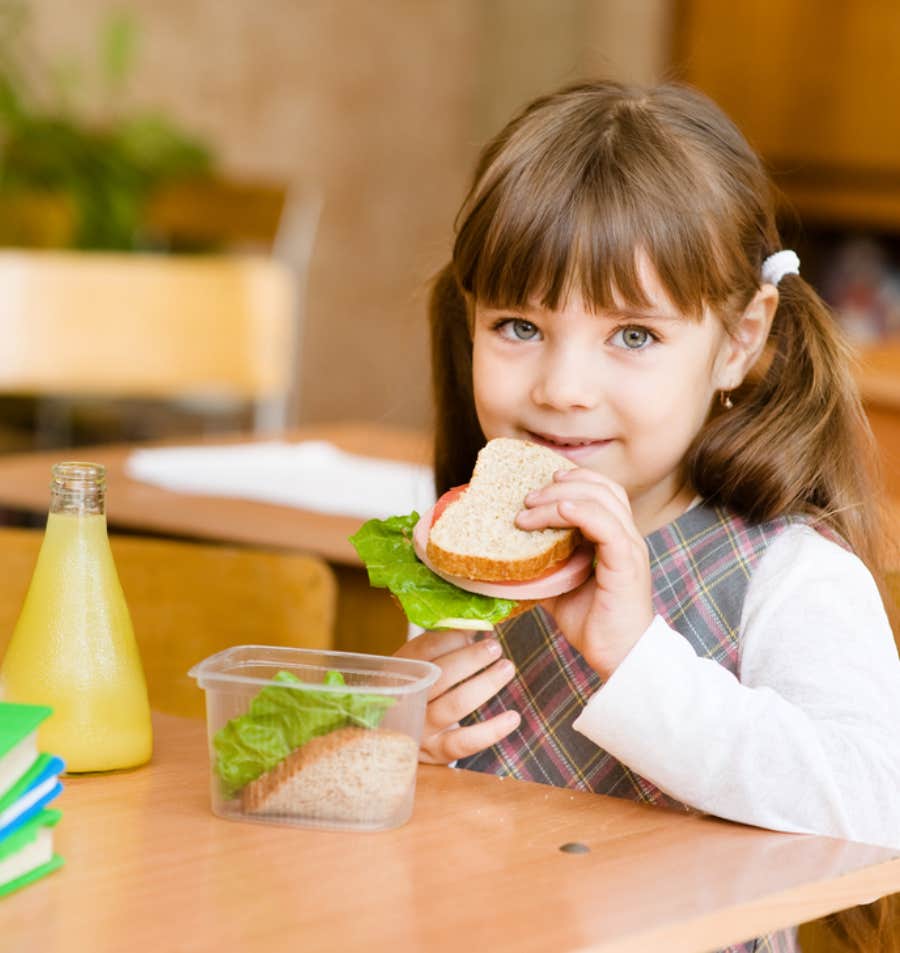Mother Furious After Her Daughter's Teacher Refused To Help Her Open Her Snack Bag Since She 'Has To Learn To Do It Herself'
Her daughter has severe food allergies where she requires special snack packages that are difficult to open.
 Evgeny Atamanenko / Roman Samborskyi / Shutterstock
Evgeny Atamanenko / Roman Samborskyi / Shutterstock After a mother discovered that her daughter left her snack bag unopened in her lunch box for several days, she asked her why she was refusing to eat them. Her daughter’s response horrified her and prompted her to ask the school if she could be moved to a different teacher’s classroom.
Later, her daughter’s former teacher messaged her, criticizing her for “making things difficult over a snack bag” and other parents have turned against her.
Now, the mother is asking others if she made the right decision and if she was overreacting.
The mother discovered that her daughter’s teacher was refusing to help her open her snack bag since she ‘had to learn how to do it herself.’
Sharing her story to the AITA subreddit, the woman revealed that her five-year-old daughter has severe food allergies. “Eating the wrong thing frequently ends in a hospital visit,” she wrote. Therefore, the mother usually sends her daughter to school with allergy-safe snack packages she discovered online so that she can eat during snack time.
One day, as the woman unpacked her daughter’s backpack, she noticed that her snack bag was still in her lunchbox, unopened. When she asked her daughter why she hadn’t eaten it, she informed her mother that her teacher refused to help her open the bag.
“She told me that her teacher used to help her but doesn't anymore,” the woman shared. “I encouraged her to ask her teacher the next day.”
However the following day, the little girl came home with her unopened snack bag again. “When I asked her about it she told me that the teacher told her that she needs to learn to open her snacks at snacktime all by herself,” the woman wrote.
Upset that her child had come home from school hungry two days in a row, she decided to email her teacher.
“I sent the teacher an email explaining that the snack is quite tough to open (even for adults sometimes) and that it would be super helpful if she could help my daughter open her snack when she is unable to do so, otherwise she has an eight-hour school day with only her lunchtime to eat,” the mother wrote.
“I was nice about it - but you better believe it did tick me off a bit that she would rather let a kid go without a snack while all the other kids ate one than help a 5-year-old open a snack.”
 Photo: Ermolaev Alexander / Shutterstock
Photo: Ermolaev Alexander / Shutterstock
The woman assumed that her email would resolve the issue. However, for the third day in a row, she found her daughter’s unopened snack bag after her teacher once again refused to help her.
This time, the concerned mother decided to call the teacher, who argued that she was attempting to teach her daughter independence.
“She said that their goal in the last few months of Kindergarten is to promote independence and that she can't do that if they have to hold the kids' hand at every turn,” the woman revealed. “She said it might help if I sent my kid in with a ‘normal’ snack instead of such a ‘bizarre, difficult to open’ one.”
The woman claims that her daughter’s teacher is well aware of her food allergies.
The teacher’s comments were enough to make the woman call her daughter’s principal and have her moved to a different classroom.
“I said that it was very inappropriate to emphasize that my daughter's snacks weren't ‘normal’ enough, given that she is unable to live a normal life,” she wrote. “I wish I could give her some Cheetos or a pack of cookies like the other kids get, but I can't and just wanted my daughter to have something a little bit more fun when all the other kids were eating those things.”
While her daughter was able to switch classrooms, her previous teacher messaged the woman informing her that her actions have “made her life more difficult.” “Apparently they've started an investigation and are monitoring the way she interacts with kids,” the woman wrote.
Other parents have come to the teacher’s defense, claiming that the treatment she has been facing is “completely unfair” and that a student’s food allergies “shouldn’t be a teacher’s issue to deal with.”
The woman asked others if she handled the situation inappropriately and if there was anything she could have done differently.
She added that she could not open her daughter’s snack for her before school since they had a “sealed container” policy.
Most people believed that the teacher’s refusal to open her students’ snack bags was wrong.
“If they are making requirements of how a snack is packaged, then they are responsible for ensuring said packaging is opened for the child if the child has difficulties opening it, regardless of food intolerances/allergies,” one Redditor commented. “This has nothing to do with teaching kids ‘independence.’”
“As a teacher myself, I can’t comprehend why this would even be an issue. Either she’s being spiteful or lazy,” another user pointed out.
Others agreed with the mother’s decision to have her daughter moved to a different classroom.
“It sounds like you're focusing on your kid's well-being. That should always be your first priority. Switching kindergarten classes isn't a huge deal; if your child's needs aren't being met that's a simple and sane solution,” one user wrote.
Others noted that allergy-friendly snack bags are especially difficult to open since they tend to be thoroughly packaged to avoid cross-contamination. They usually require scissors to open them.
While teaching children independence is essential for their development, there should be an exception when their well-being is at stake.
Children should not be forced to trip all day if they are having trouble tying their shoes, walk around with an open wound because they do not know how to apply a Band-Aid, and they certainly should not be left hungry all day because they are having difficulties opening a snack bag.
In these situations, it is more than okay to step in and lend them a helping hand.
Megan Quinn is a writer at YourTango who covers entertainment and news, self, love, and relationships.
